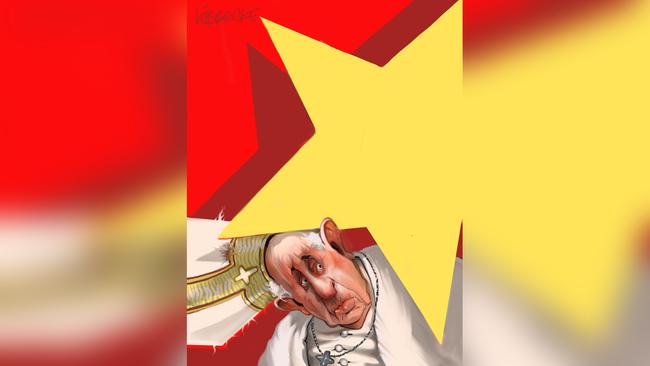Pope’s silence on China’s religious persecutions is deafening

“You can never compromise with a totalitarian regime because they want everything,” Zen says. “Would you have encouraged St Joseph to negotiate with Herod?” Zen has always spoken with a bluntness unusual for a prince of the church, and his hard words about the still-secret 2018 agreement between Beijing and Rome are plainly getting under the Vatican’s skin.
Many are desperate to see him discredited. Thus La Civilta Cattolica, the Jesuit journal close to (fellow Jesuit) Pope Francis, just ran a piece that resurrected former bishop of Shanghai Aloysius Jin Luxian as a countermodel to Zen. It even quotes Jin to imply there is no way forward until Zen goes off, ahem, to his eternal reward.
Jin was also a Jesuit. In 1988 the Chinese communists installed him as bishop of Shanghai in defiance of the Vatican, although not quite 20 years later the cardinal would reconcile with and be recognised by Rome. He died in 2013.
Like Zen, Jin provokes strong reactions. Many traditional Catholics regard him as a communist collaborator. But Zen says it’s “ridiculous” to pit him against Jin. Jin, he says, was a “good friend”, a “great bishop” and a fellow Shanghainese who “on the whole” used his wiles “for the good of the church”.
“Yes, he was two-faced,” the cardinal says. “But he had to be to do all the good that he did.”
Their friendship began in the 1980s when Jin invited then-Father Zen to teach in Shanghai’s seminary. The cardinal says he has a hard time believing that Jin — who spent 27 years in prison — would be as naive about the communists as today’s Vatican diplomats.
In many ways, this ground has been trod before. The Civilta Cattolica model is essentially the Ostpolitik of the 1960s and 70s. Back then, the Vatican accepted the status quo of the Iron Curtain and muted its criticism of eastern Europe’s communist regimes in hopes of better treatment for the faithful. Then came Pope John Paul II, the first pope from a communist land, who challenged these regimes where they were most vulnerable: their moral authority.
Because it’s China this time, the Civilta Cattolica model also carries with it the whiff of missionary romanticism. Its champions implicitly posture as latter-day Matteo Riccis, the extraordinary 16th-century Jesuit who sought to incorporate aspects of Chinese culture into Catholic worship.
But here’s the rub. The 2018 Vatican concordat with Beijing was not the work of Chinese Catholics. It was an almost exclusively European affair, led primarily by Pope Francis, Cardinal Pietro Parolin and Archbishop Claudio Maria Celli. Instead of fostering a “reconciliation of hearts” between the patriotic and underground wings of the church, Zen says, the agreement is attempting to impose a false and destructive institutional unity.
Zen recently likened it to the 1933 concordat Germany negotiated with the Vatican soon after Hitler became chancellor. Like the Nazis, who violated the concordat almost as soon as it was signed, China under President Xi Jinping has only stepped up persecution since the deal was struck. Meanwhile, the price extracted has been high: the Pope’s silence.
This silence comes at a particularly terrible moment, when the Chinese President is busy persecuting everyone from Tibetan Buddhists and Muslim Uighurs to independent “house church” Christians and Falun Gong practitioners.
Nor is Beijing making any effort to hide its intentions. China has just named Xia Baolong as its new point man in Hong Kong. Xia is best known for tearing crosses off Chinese churches.
Yet the leader of the world’s largest religious denomination — a Pope who rails against everything from airconditioning to Donald Trump — utters not a peep of protest against what is arguably the world’s largest persecutor of religion.
For his part, Zen emphasises that his own criticism is directed at “the Holy See and not the Holy Father”. The Pope himself, he says, has shown him “extraordinary” affection.
“The bad things,” the cardinal says, do not originate with Pope Francis but with the “bad people” advising him.
Meanwhile, if the Vatican is looking for a diplomatic approach that combines the wisdom, cunning and respect for Chinese culture represented by Ricci, instead of putting Europeans in the lead, it could start with bishops who have experience of living under and dealing with the Chinese Communist Party. Not to mention a little more honesty about what it has in fact agreed to.
“Why must the text of the agreement stay secret?” Zen asks. “Secret even from me — a Chinese cardinal! Come on.”
The Wall Street Journal



The Catholic Church in China is being “murdered” while the Vatican stands idly by. So alleged Cardinal Joseph Zen in an appeal he sent to the world’s 223 cardinals in September last year but that was made public only recently.